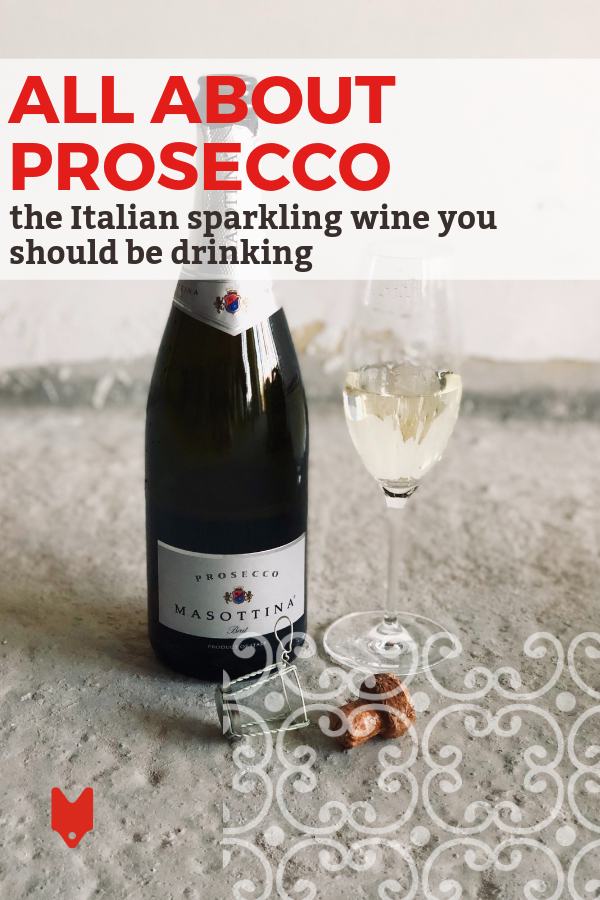Prosciutto. Parmigiano. Prosecco. There are certain words that just recall Italy. But when it comes to the last one, the love for it is often coupled with a justified confusion.
Say “Prosecco” to someone, and the image that will come to their mind is a chalice of golden, bubbly liquid, sipped on a terrace in Italy. It’s relaxation in a glass.
But ask them, “What is Prosecco, exactly?” and you might get something like, “It’s Italian Champagne.” Yes, it’s a sparkling white wine produced in Italy. However, we can go further. Always wanted to know what makes prosecco prosecco? We’ve prepared this guide for your next trip to Italy—or your local wine store.

What is Prosecco and where does it come from?
When talking about any wine, we have to take three things into account: grapes, terroir and method of production. After all, a French Burgundy and an Oregon pinot both use the same grape (pinot noir), just cultivated in wildly different environments and processed in different ways.
Prosecco is a white wine from northeast Italy, specifically the Veneto and Friuli Venezia Giulia regions. It’s made from the glera grape, whose origin is in neighboring Slovenia. In fact, the name “Prosecco” comes from the eponymous village, located near the border of the two countries, whose name in Slovenian is Prosek. The glera may be supplemented with small quantities of other white grapes, like pinot grigio, but at least 85 percent must be glera.
While Prosecco is most famous as a vino spumante (sparkling wine), it doesn’t necessarily need to be. It can also be frizzante (slightly bubbly), or even tranquillo (no bubbles). For our purposes here, we’ll mostly be talking about prosecco spumante. It has a characteristic crispness and freshness of flavor, ever-so-slightly tart and fragrant, a whitish-yellow color, and 11 percent alcohol—about a point less than traditional champagne.
One of the draws of Prosecco is its cost and availability. This mainly comes from its production method, called the Martinotti, or “tank” method. When making true Champagne, for example, the base white wine is fermented again in the individual bottle, and undergoes a series of mechanical and chemical processes to promote re-fermentation and preserve the bubbles. This is laborious and can take years (which is why Champagne is so expensive). Most Prosecco, however, uses the Martinotti method, where big batches of base wine are fermented in pressurized steel tanks for only around 30 days, before being bottled.
What’s up, DOC?
“Prosecco” has become a shorthand for any sparkling white wine from Italy. However, as similar as Prosecco and, say, Franciacorta are in taste and appearance, true “Prosecco” is a separate thing. It all comes down to two acronyms: DOC and DOCG.
DOC stands for Denominazione di Origine Controllata, or “Denomination of Certified Origin.” DOC is an official designation of the Italian government. This means that the given wine is entirely produced in the required region, using the required grapes and techniques. (The commonly seen DOP is basically the same thing, just applied to foodstuffs like cheese.)
Therefore, DOC Prosecco is Prosecco that is produced with the correct quantity of glera grapes, fermented in the correct types of tanks, and most importantly, produced in one of the authorized production zones: the provinces of Gorizia, Pordenone, Trieste and Udine in Friuli Venezia Giulia and the provinces of Belluno, Padua, Treviso, Venice and Vicenza in Veneto.
DOCG is Denominazione di Origine Controllata e Garantita. Essentially, it’s a more rigorous (literally, “guaranteed”) mark of quality and authenticity. In order to qualify for DOCG status, a wine might be subjected to even more stringent geographic and production standards, and has to be tasted by the Italian Ministry of Agriculture. There are only two of these DOCG Prosecco Superiore: Conegliano Valdobbiadene and Asolo.
There are many great wines in Italy that don’t have DOC or DOCG status. But Prosecco is one that, if you want to taste the real thing and get your money’s worth, you want DOC. Check for the tell-tale white slip that reads “DOC” and is placed over the cork.

How to drink Prosecco
Prosecco is, like most sparkling wine, meant to be drunk either during aperitivo or at the beginning of a meal. It’s best enjoyed within a year of harvest, served cold, in a tulip-shaped wine glass, not a champagne flute—this way, the bubbles don’t dissipate too quickly but you can still enjoy the perfume.
All around Italy (and especially in Venice), Italians enjoy a glass of Prosecco to wash down snacks like cured meat, cheeses and marinated fish—there are few appetizers that Prosecco doesn’t pair well with.
What’s interesting is that, for all of this talk about DOC and correct drinking protocol, Prosecco is a wine that’s equally-known for its use in cocktails. At the world-famous Harry’s Bar in Venice, the iconic Bellini is made with peach and, you guessed it, Prosecco.
The Spritz is ubiquitous in Italy now. Originating in the Veneto, this is a cocktail of Prosecco, sparkling water, and a strong liqueur like Aperol or Campari. If you walk into Bar San Calisto in Rome on a Saturday night, the noise of the crowd is punctuated every thirty seconds by the pop of a Prosecco cork, as the bartenders scramble to make hundreds and hundreds of spritzes.

Then and Now
It’s funny how things change. In 1986, the great wine critic Hugh Johnson described Prosecco (one might argue a bit dismissively) as “the local fizz of Venice … nobody could accuse it of apeing Champagne, but it goes down well in the famous Bellinis in Harry’s Bar.” For years, Prosecco was considered a regional specialty, or something good for cocktails, but not highly-valued.
Fast forward to now. Prosecco is one of Italy’s fastest-growing exports. After the global financial crisis of 2008, when consumers and restaurants alike were seeking cheaper alternatives to Champagne, Prosecco seemed like a godsend. Now, it’s a mainstay not only on menus in Italy, but also in America (although, at $13 a glass it never seems to taste as good…).
But with this newfound popularity is also a newfound interest, and therefore demand for increasing variety and quality. For example, Jessica Chastain’s husband is an Italian businessman whose latest venture is Fiol, a luxury Prosecco brand meant to rival Champagne in quality while still remaining affordable.
In the end, though, there’s still nothing better than a glass of “DOCC” Prosecco. That’s a glass of DOC Prosecco, sipped in Venice, overlooking that extra “C”: a canal.